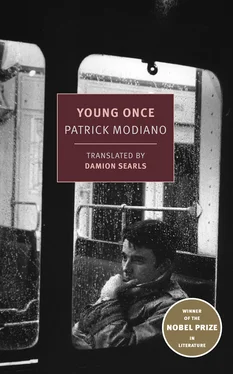Jacqueline Boivin chewed quietly on her sandwich. Odile had a cigarette at her lips, which Louis lit with the Zippo. And Brossier? He seemed sad, all of a sudden, from bringing up these distant memories. His face was drawn, and Louis was sorry he had asked him these questions.
“It’s true, I came here from Normandy to go to art school.”
He looked paler and paler, as though realizing that the satchel he had on his knees, his tracksuit jacket and student status, even Jacqueline herself with her gray pleated skirt and beige twinset, were no longer enough to protect him from the passage of time and the indifference of the world.
•
Louis started working again, as a watchman in the garage on rue Delaizement, mornings and afternoons. Or else he took letters to addresses in Paris and on the outskirts, the same as he’d done before leaving for England.
He had refused his commission, despite Bejardy’s insistence, and when Bejardy told him, in a voice of feigned indifference, that the movers were coming to take the furniture and the files out of the garage, Louis could sense disaster in the air, but he didn’t dare ask any questions.
“I’m liquidating the garage,” Bejardy told him.
It was already empty. The American cars had disappeared, the Mercedes too. The only car left was an old gray Simca with flat tires, all the way in the back, but it had never once moved from its place.
One afternoon, Louis helped Bejardy move the files down to where a brick chimney ran up the wall, next to the Simca. Bejardy put a couple of logs in the fireplace, opened the file folders, threw the pages into the fire one by one, and stirred the ashes with a long iron poker.
“Fire purifies everything,” he said, lost in thought.
“So, Brossier isn’t working with us anymore?” Louis asked.
“How do you know?”
“I saw him the other day.”
Bejardy, sitting on the running board of the Simca, studied one of the files. He raised his head.
“I think he’s in love. What can I do about that?”
“He told me he’s known you a long time…”
“Yes, we’re old friends, almost since childhood,” Bejardy said in an evasive tone.
“You met each other right after the war, in a family pension in Neuilly?”
A nervous look passed over Bejardy’s face.
“What else did he tell you?”
“Nothing. That you lived there with your mother.”
“I see. He told you about my mother?”
A hint of a smile. Then his face clouded over again.
“I’ve spent my whole life dragging Brossier behind me. Slowing me down. It often happens that way, you know, things like that.”
He stood up and went over to the fireplace to throw several pages in.
“He told me he wants to try to live his own life now, Louis.” And he let out a short laugh, more like a cough. “The only problem is, he’s too old. One day he’ll come looking for me again, with his tail between his legs, I’m sure of it. But by then I’ll be gone…”
Rays of sunlight shone through the windows in back, making a large patch of light on the floor. Louis and Bejardy stayed sitting in the middle of this patch, like hikers stopping for a moment in a clearing. The fire crackled.
“I’m liquidating my affairs here,” Bejardy said. “But I need you to do one last thing for me, my dear Louis.”
•
He came out of a cross street onto Quai Louis-Blériot and walked into the building, the green shopping bag in his hand. Bejardy opened the door for him.
“You’re sure you have all the rest of the files?”
“Yes.”
Bejardy quickly looked through the folders stuffed in the bag.
“Give them here.”
He walked ahead of Louis. From behind, with the shopping bag, he had a strange silhouette, like someone coming back from the market.
In the living room, Louis saw that the furniture was gone. There was nothing left but the large sofa and two chairs. The bookshelves had been emptied out, too, and the books were stacked in piles against the wall.
“I’m going to liquidate the apartment,” Bejardy said. “If you’re interested in any of these books…”
They went over to the sofa. Nicole Haas, in riding pants, was lying there asleep. Her cheek was pressed against the arm of the sofa, and Louis was moved by the relaxed face, the slightly open mouth. Bejardy tapped her softly on the shoulder. She opened her eyes and sat up when she saw Louis.
“Sorry…”
“Nothing to worry about, darling.”
The wind was billowing the gauze curtains through the open French windows, the same as on the day when Odile and Louis had met Nicole Haas for the first time.
“You should make the most of the nice weather, Coco,” Bejardy said. “What are you doing this afternoon?”
“I need to go see the horses.”
“Louis can take you in the car. I need to stay here. I have some work to do.”
The telephone rang and Bejardy went to the other end of the room to answer it. Louis sat down facing Nicole Haas. She didn’t say anything but she smiled at him, her face still a bit sleepy. And that smile, those bright eyes fixed on him, the dreamlike undulation of the curtains in the wind, the sound of a boat’s motor — it all made up one of the moments that remained in his memory.
•
On rue de la Ferme, in Neuilly, she told him to stop in front of a low building with a bar that filled the whole ground floor: the Lauby. Wood walls. Semidarkness. Photographs of horses and riders. Stirrups. Whips. The smell of leather.
A man at one of the tables stood up and came over to kiss Nicole Haas’s hand. He was in riding clothes too: a small man, very stiff, with black hair and a black mustache, looking a bit like a wax dummy. The words got scrambled in his mouth — this syllable delayed, that one swallowed, the next stammered — and he imitated the halting pronunciation of certain Anglo-Saxons so perfectly that you ended up wondering if he was even speaking French. Nicole Haas told Louis that this man was a marquis, and that during a long stay in America he had married a movie actress and become her “manager.” On returning to France, he had taken over the stables across the street from the Lauby. The only thing he had brought back from America was the title of “manager,” which now appeared on his calling cards and which he valued more than his title of nobility.
“So, you’re leaving your horses for a while again, Nicole?”
“Yes. Another month.”
“And then Argentina? It’s decided? Tell me.”
“I don’t know.”
“You must tell me before you go. I have very good friends there. Dodero, Gracida… Pierre Eyzaguirre… No, he’s Chilean. One can never tell them apart, all those gauchos.”
The marquis’s voice had taken on a very shrill tone when he said his friends’ names.
“Something to drink? Would you like one? Scotch? Coffee? Tea? Tell me.”
He twirled his hands in strange circles, as though his shirt cuffs were bothering him.
“Do you ride?”
“No,” Louis said.
“Why not?”
“He hasn’t had free time to learn yet,” Nicole Haas said.
“You simply must start,” the marquis said gravely.
They left the Lauby and walked through the stable gates.
“I will leave you here,” the marquis said. “I have to give a riding lesson to Robert de Unzue’s daughter. See you very soon, Nicole. And be sure to tell me about Argentina, yes? I also need to know so I can take care of the horses…”
The marquis waved goodbye with an abrupt movement of his hand, and they crossed the sand-covered courtyard to the stables. Nicole Haas wanted to show Louis her horses. She had two, a dappled gray and a bay. They stuck their heads out of their stalls and she stroked their heads.
Читать дальше












